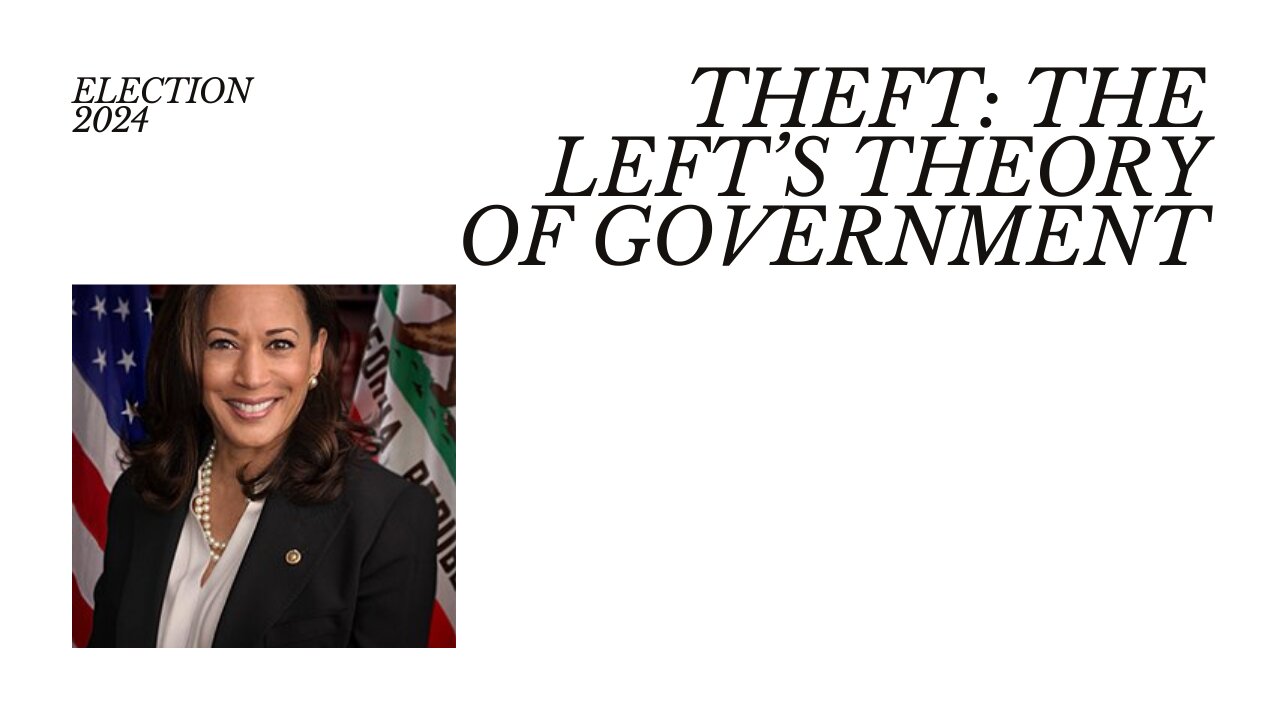Premium Only Content

Theft – the left’s theory of government
Theft – the left’s theory of government
By Terry A. Hurlbut
The Election of 2024 reveals one thing above all: the American political left base their theory of government on theft. Donald Trump’s theory of government is that it exists to prevent theft – and what the government steals, it must repay. Certain media voices – who, as adults, should know better – are suffering apparent nervous breakdowns because a theft system faces near-certain electoral defeat. So the time has come to explain, not only that theft is wrong, but where people got the idea that theft was a legitimate theory or function of government.
Even children know that theft is wrong
One best illustrates elementary principles by example – and CNAV can offer a real-life example, from an elementary school classroom. This being Halloween, children in elementary or “lower” school often bring decorations to class. (In our day, we made ours, but that’s a debate for another day.) One child sported three decorations of a certain type on the lanyard he wore around his neck. This pupil had the bad sense to take off his lanyard and lay it on his desk for an unguarded moment. Lo and behold, he returned to find one of his declarations missing.
Fortunately his classmates bore witness in his favor to the teacher. Some of them had witnessed the theft – and all knew that this particular thief made a habit of it. So, yes, they “ratted him out.” Contrary to popular imagination, students have some things they will not stand for – and one is an habitual thief.
When the teacher – and ultimately the principal – confronted the thief, first he opened with the usual evasive non-answers. Finally he blurted out the real issue – at least in his mind. “So-and-so already had three,” he said. “He didn’t need that many.”
Perhaps Mika Brzezinski of MSNBC – who has a long history of unhinged pronouncements on American presidential politics – might have excused the theft on the precise grounds the thief raised. Again, to the great good luck of the victim of the theft, teacher and principal rejected those grounds. “No!” they both said. “That’s wrong!”
Another example
Christian cinema provides a more public, if fictitious, example, from the motion picture Time Changer (2002). In 1890 (a “simpler” and more moral time), a seminary professor catches a boy stealing marbles from a neighbor. Today, whether such a professor would do anything about it, is hit or miss. But in 1890, all adults knew at least that theft, no matter whose child committed it, was every adult’s business. (At least, in America they did.) So this professor tells the boy that stealing is wrong. But, as in the real-life example above, the boy pleads his “need” as superior to the other boy’s “need.”
Karl Marx and Friedrich Engels’ Manifest der Kommunistischen Partei had been “out” for forty-two years. But not until a cold, calculating plotter named Vladimir Ilyich Lenin would it become “current.” That work first set forth, in formal prose, the false principle of “need” as an excuse – indeed, justification – for theft. Today a few adults – a remnant – remain who reject the “need” excuse. They wouldn’t dream even of visiting the “need” issue. Sadly, the American left – and perhaps the left everywhere – have fully embraced “need” as an overriding principle. Ironically, it took a stone-cold atheist (Ayn Rand) to illustrate (Atlas Shrugged, 1957) how a society that uses “need” as a moral principle, inevitably breaks down. When theft – whether of material goods, means of exchange, or simple mental capacity (i.e., copyright or patent infringement or even their abolition) rules, society’s productive members will secede – for self-defense.
Lawrence Kohlberg allows an excuse for theft
In 1958, psychiatrist Lawrence Kohlberg laid the basis for just such misguided thinking. His Six Stages of Moral Development (illustrated here), without reference to a moral standard, created the essential weakness. In order, they are:
1. Obeying the law, rules, or orders of superior authorities, to avoid punishment by them,
2. Playing by such rules to earn an immediate reward,
3. Cultivating a reputation as a “good boy/girl” or “model citizen,”
4. Devotion to the simple principle of law and order – while still accepting uncritically the justice of that law,
5. Understanding that society operates under a contract, and accepting the wisdom of upholding that contract, and finally:
6. Developing or embracing a universal principle, independent of the prevailing social contract.
Stages One and Two represent pre-school-level thinking, and Three and Four represent preadolescent “conventional” thinking. Stages Five and Six allegedly represent adult thinking but also might apply in high and “junior high” (upper middle) school.
But! Kohlberg never articulated his preferred universal principle. Instead, he implied that in at least seven Dilemmas, or tests of moral thinking. The problem with these dilemmas is that they all lend themselves to false “solutions” having their basis in “need.” This leads to morally monstrous decisions at Stage Six. This becomes especially apparent from the questions Kohlberg proposed after setting forth each dilemma. In blunt fact, he drives the student to excuse, or justify, theft in order to avoid the stigma of being “stuck in child-like thinking,” i.e., Stages One and Two.
The Kohlberg Dilemmas
The best readily available list of Kohlberg’s Dilemmas is, sadly, incomplete. Worse, the original hosts – Haverford College – no longer maintains it. Fortunately the Wayback Machine maintains every saved copy.
From the most recent “save” (May 20, 2022), the four remaining start with “Joe and his father.”
Joe is a fourteen-year-old boy who wanted to go to camp very much. His father promised him he could go if he saved up the money for it himself. So Joe worked hard at his paper route and saved up the forty dollars it cost to go to camp, and a little more besides. But just before camp was going to start, his father changed his mind. Some of his friends decided to go on a special fishing trip, and Joe's father was short of the money it would cost. So he told Joe to give him the money he had saved from the paper route. Joe didn't want to give up going to camp, so he thinks of refusing to give his father the money.
Should Joe refuse? But also: did his father have a right to demand the money for his own pleasure? As is common to all of Kohlberg’s Dilemmas, the debate wrongly turns on who needs the money more. By any proper moral standard, the father does not have that right. He promised, and revoking a promise is itself a kind of theft. Furthermore, the question is incomplete. How short of money is the father? How much extra did Joe save up? And why did the father come up short? This Dilemma rewards bad planning and the non-workability of compromise.
Excusing theft – fraud – by the moral compromise of the victim of that fraud
Next comes another Dilemma that seems to give the adult a better – but still lame – excuse for revoking a promise:
Judy was a twelve-year-old girl. Her mother promised her that she could go to a special rock concert coming to their town if she saved up from baby-sitting and lunch money to buy a ticket to the concert. She managed to save up the fifteen dollars the ticket cost plus another five dollars. But then her mother changed her mind and told Judy that she had to spend the money on new clothes for school. Judy was disappointed and decided to go to the concert anyway. She bought a ticket and told her mother that she had only been able to save five dollars. That Saturday she went to the performance and told her mother that she was spending the day with a friend. A week passed without her mother finding out. Judy then told her older sister, Louise, that she had gone to the performance and had lied to her mother about it. Louise wonders whether to tell their mother what Judy did.
This Dilemma poses three problems: revocation of a promise, fraud, and laying information:
1. When it is “none of the informant’s business,” and
2. With a compromised authority.
Two wrongs do not make a right. So fraud – a “nonviolent” form of theft – is not just here. But the mother is responsible for instilling moral lessons. She teaches a poor lesson indeed by revoking a promise – and worse, laying on her an obligation she didn’t think to mention to begin with.
As for “laying information,” the older sister would do better to counsel her younger sister to “come clean” herself. Her conscience has already troubled her enough for her to confess to her older sister. Why not take the next step? But the Dilemma as posed, tells the student to choose between obedience and the sanctioning of theft – i.e., fraud.
The Heinz Dilemma
Next is the “Granddaddy of All Dilemmas,” the one that, more than any other, bears mention in introductory psychology courses. It is the Heinz Dilemma:
In Europe, a woman was near death from a special kind of cancer. There was one drug that the doctors thought might save her. It was a form of radium that a druggist in the same town had recently discovered. The drug was expensive to make, but the druggist was charging ten times what the drug cost him to make. He paid $400 for the radium and charged $4,000 for a small dose of the drug. The sick woman's husband, Heinz, went to everyone he knew to borrow the money and tried every legal means, but he could only get together about $2,000, which is half of what it cost. He told the druggist that his wife was dying, and asked him to sell it cheaper or let him pay later. But the druggist said, "No, I discovered the drug and I'm going to make money from it." So, having tried every legal means, Heinz gets desperate and considers breaking into the man's store to steal the drug for his wife.
Of all the Kohlberg Dilemmas, this has caused the greatest social damage. The Stage Six answer, which your editor remembers reading in his textbook in Psych 101 at Yale, is that Heinz’ need – or his wife’s need – justifies the theft. This forms the basis for every wrongheaded government policy beginning with Franklin D. Roosevelt’s New Deal. No, Heinz has no right to steal that drug, no matter how shortsighted the pharmacist’s motives. In fact the only compromise of the pharmacist’s motive is failure to see the advertising value of a “showcase.” He has made no promises to Heinz or to anyone else.
And as usual, the question is still incomplete. What is the overall state of the economy in this European country (presumably one of the German Free-world Zones – American, British or French)? What would happen if The New York Times, The London Times, or Le Figaro picked up the story and splashed it on its front page? Mightn’t that provoke an outpouring of charitable fellow-feeling sufficient to raise four thousand dollars and then some?
Two kinds of theft – which is worse?
Now we come to an even worse Dilemma. The only reason this hasn’t caused so much damage is that it is that few people know about it.
Two young men, brothers, had got into serious trouble. They were secretly leaving town in a hurry and needed money. Karl, the older one, broke into a store and stole a thousand dollars. Bob, the younger one, went to a retired old man who was known to help people in town. He told the man that he was very sick and that he needed a thousand dollars to pay for an operation. Bob asked the old man to lend him the money and promised that he would pay him back when he recovered. Really Bob wasn't sick at all, and he had no intention of paying the man back. Although the old man didn't know Bob very well, he lent him the money. So Bob and Karl skipped town, each with a thousand dollars.
Lay aside for a moment what kind of trouble Karl and Bob got into, and how. Kohlberg asks his students to decide who committed the worse offense: Karl, the burglar, or Bob, the fraudster? To his credit, whoever came up with the questions seems to remind the student of other considerations. What, for example, was the worst part of the fraud? Was it lying about the need, or giving someone an I.O.U. he had no intention of redeeming? And has Karl, the burglar, violated the property rights of another by stealing a thousand dollars (which today might be worth twenty thousand) from his store?
Sadly, the other college courses probably teach that property rights are unimportant, and worse, an instrument of oppression. Similarly, Lawrence Lessig would say Heinz’ pharmacist has no right to his intellectual property because “information wants to be free.” And the reason college-educated people would vote for the Theft Administration is that college has taught them to excuse theft. A thief is an irregular wealth-redistribution agent. (And a murderer is an irregular population thinner – but that also is a debate for another day.)
By this time, one would excuse anything
Besides: this Dilemma is the seventh in the original list. (Why Haverford didn’t teach Dilemmas Four, Five and Six, is impossible to determine.) By the time the student reaches this Dilemma, he already is willing to excuse Karl and Bob. What has either man done – aside from why they’re in trouble with the law to begin with – that is worse than Joe refusing his father, Judy defrauding her mother, or Heinz stealing the drug? The only reason to condemn either man is that they acted from an ignoble need.
And even that the student might finesse, by saying to himself, “These two men committed revolution, not ordinary theft.” And why might they be in trouble? Did they blow up or shoot up a synagogue? This being 1958, it would be two years after the First Arab-Israeli War – the Suez Crisis. A highfalutin “expansion of social conscience” might actually justify such a repugnant act. Today it would fall one year and three weeks after the outbreak of the Fourth Arab-Israel War. The same twisted reasoning would apply.
Jesus is the Moral Lodestone
These examples of tortured moral – indeed amoral – reasoning come about because modern society rejected Jesus Christ. For centuries Jesus Christ served as the Moral Compass – or Moral Lodestone – of society. (A lodestone gives a magnetic compass its property of orienting itself in the directions of north and south. Thus the lodestone makes the compass.)
But as Rich Christiano, screenwriter and director of Time Changer, points out: one cannot effectively promote the teachings of Christ without the Christ of the teachings. To return to the example of that film: that professor has written a book proposing to teach morality apart from the Good News of salvation. One of his colleagues objects – and the rules of their institution require that all its endorsements be unanimous. This colleague is also an inventor – and has experimented with time travel. So the inventor sends that professor 100 years forward in time – to 1990. There – or then – he can see what – in real life – his wrongheaded theories have wrought! Returning to his own time, he revises his manuscript.
Had a thing like that actually happened, our own history would be far different. But it didn’t and it isn’t. Behold where we stand today! Crime is crippling, and the purchasing power of money is nearly nonexistent. For that, blame not only the policies of the Biden-Harris administration, but also the lack of moral instruction over generations. That lack produces the thieves and murderers, as well as either electoral fraud – or simple wrong choices.
Link to:
The article:
https://cnav.news/2024/10/29/accountability/clergy-accountability/theft-left-theory-government/
Time Changer on the Internet Movie Database:
https://www.imdb.com/title/tt0295725/
Simply Psychology – list of Kohlberg’s Six Stages of Moral Development:
https://www.simplypsychology.org/kohlberg.html
From Haverford College, through the Wayback Machine: four of Kohlberg’s seven Dilemmas:
https://web.archive.org/web/20220520011723/http://ww3.haverford.edu/psychology/ddavis/p109g/kohlberg.dilemmas.html
Declarations of Truth X feed:
https://x.com/DecTruth
Declarations of Truth Locals Community:
https://declarationsoftruth.locals.com/
Conservative News and Views:
https://cnav.news/
Clixnet Media
https://clixnet.com/
-
 23:00
23:00
Declarations of Truth
9 days agoLaura Loomer prompts NSC housecleaning
1281 -
 LIVE
LIVE
Joe Pags
59 minutes agoThe Joe Pags Show 4-14-25
841 watching -
 LIVE
LIVE
Sarah Westall
1 hour agoGlobal Agenda: Starve Small Business of Funds w/ Bruce De Torres
122 watching -
 LIVE
LIVE
2 MIKES LIVE
3 hours ago2 MIKES LIVE #205 with guest Nick Adams!
147 watching -
 LIVE
LIVE
LFA TV
7 hours agoThe Bread of Life | TRUMPET DAILY 4.14.25 7PM
87 watching -
 37:52
37:52
Kimberly Guilfoyle
2 hours agoThe Trump Effect, Plus More Scandals for Leticia James, Live with Roger Stone | Ep213
20.5K10 -
 1:13:45
1:13:45
Kim Iversen
2 hours agoWe're LOSING The Tariff War With China, How Our Elites Sold Us Out | Oct 7th Rape COVERUP
45.5K51 -
 1:23:13
1:23:13
Redacted News
3 hours agoTrump declaring MARTIAL LAW on April 20th according to fearmonger liberals, they want civil war
111K109 -
 2:21:58
2:21:58
vivafrei
10 hours agoEp. 259: Shapiro Home FIREBOMBED! Pavlovski Goes NUCLEAR on Dorsey Over AI! Elections Canada & MORE
96.1K50 -
 LIVE
LIVE
The Amber May Show
3 hours agoFinally, The Truth Comes Out In The News About What We Have Known For A While| Sam Anthony
177 watching